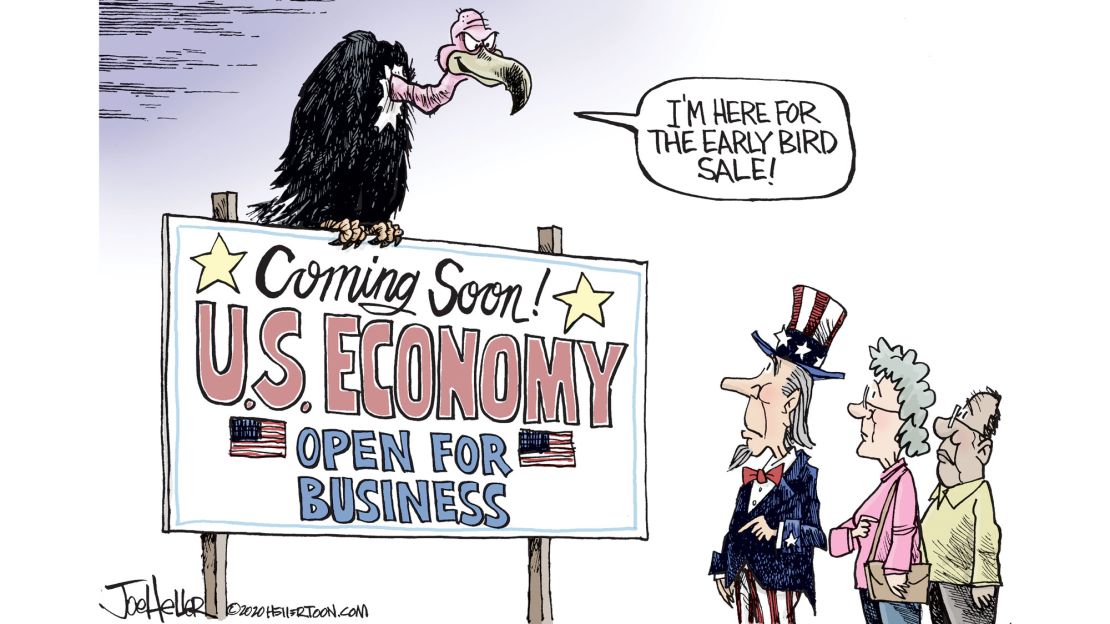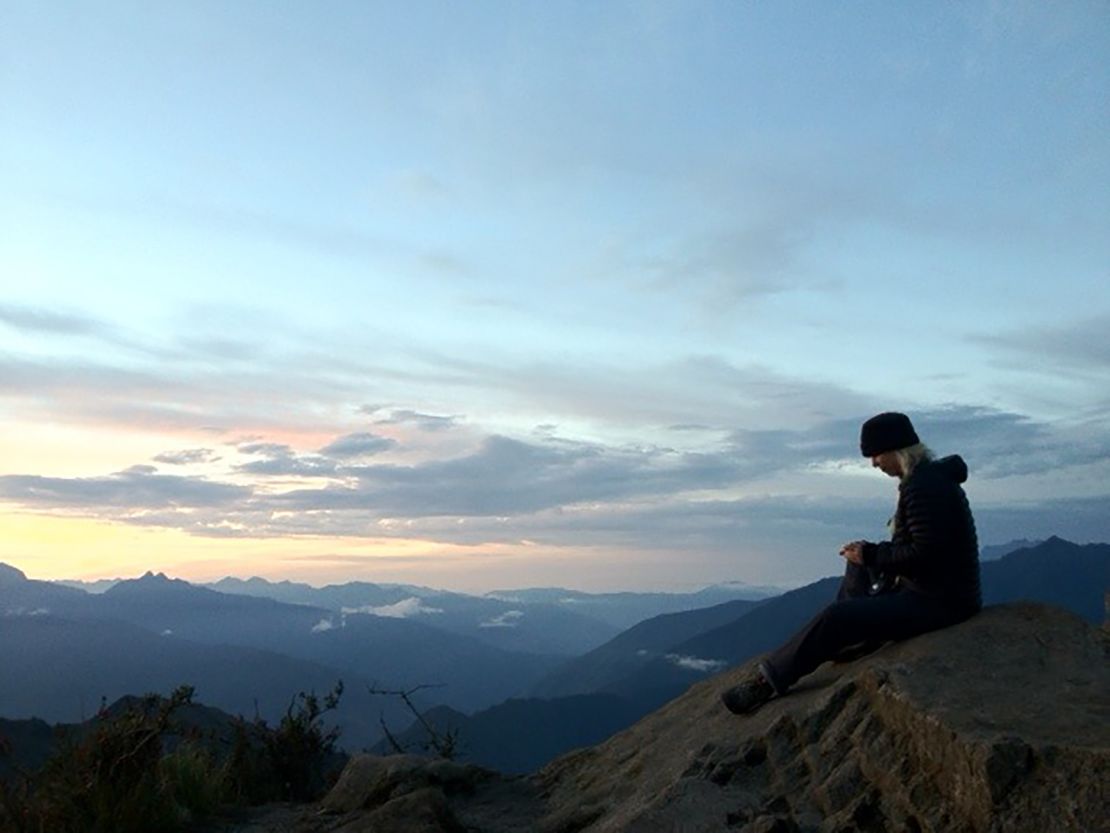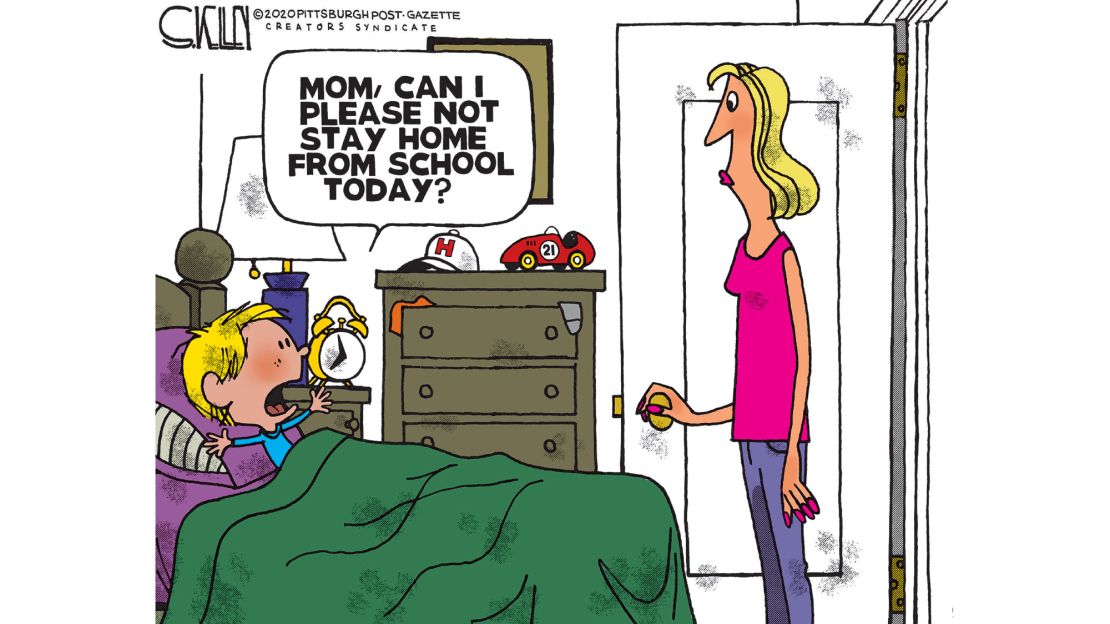Editor’s Note: Sign up to get our new weekly column as a newsletter. We’re looking back at the strongest, smartest opinion takes of the week from CNN and other outlets.
As a hotel and casino entrepreneur, Donald Trump had his fair share of grand openings. On October 26, 2016, for example, Trump officially unveiled the Trump International Hotel in the Old Post Office on Pennsylvania Avenue in Washington. “With the notable exception of 1600 Pennsylvania Avenue, this is the most coveted piece of real estate in Washington,” he said. Less than two weeks later, he won occupancy of 1600.
And, confined there last week, he clearly itched to stage a much bigger event: the reopening of America, a nation where 97% of the people are under stay-at-home orders to slow the spread of Covid-19. But as Trump pushed for the relaxation of restrictions, the disease continued exacting a relentless toll in infections and deaths.
On Monday, Trump claimed he had “total” authority in this emergency to make the key decisions. On Thursday, he said it was the nation’s governors who should make the call on when to reopen. And on Friday he tweeted, “LIBERATE MINNESOTA!” “LIBERATE MICHIGAN!” and “LIBERATE VIRGINIA…”
“The problem is that we have a reality show president who has run headlong into a grim reality for which he was ill-equipped and unprepared,” wrote David Axelrod. “You can’t spin a pandemic, Mr. President. And the numbers that matter aren’t your TV ratings.”
The “White House response to coronavirus has been chaotic, wildly inconsistent, and often dangerous,” Jill Filipovic argued. “Trump is threatened by the prospect of governors working together outside of his authority, because he’s already seen many of them prove themselves more competent leaders than he is. And they have the approval ratings to show for it.”
With his tweets, “Trump is calling for open revolt in three states – all of which are potentially competitive in 2020 and run by Democratic governors,” wrote Frida Ghitis. “The three states are also home to thousands of people diagnosed with Covid-19, a disease that has killed tens of thousands of Americans, with the potential to kill millions in the US if allowed to freely run its course in the population.”
Changing the subject

In between asserting and relinquishing his authority, Trump railed at the World Health Organization and congressional Democrats. On Tuesday he announced he is cutting off funding to the WHO, the planet-wide organization responsible for battling the virus, and on Wednesday he threatened to become the first President to adjourn Congress.
“Trump is desperately trying to deflect attention from his own catastrophic behavior,” wrote Jeffrey D. Sachs. “He has presided over one of the largest security failures in US history, with far more deaths than at Pearl Harbor or on 9/11. While the President has called for an investigation of the WHO, it’s his own administration’s disastrous response to the crisis that needs scrutiny.”
The White House’s coronavirus task force recommended a three-phase relaxation of the shutdown, on timetables that would vary by state, but many experts warned that a swift reopening would be risky – until there is widespread testing and tracing.
“As much as everyone would like to be back to some kind of normalcy by next month, the chance of that materializing is slim to none,” wrote Dr. Irwin Redlener. “We have a lot to learn from countries that initially seemed to have the outbreak under control but are now beginning to see a resurgence. Singapore and Hong Kong are already experiencing new outbreaks of Covid-19, possibly due to travelers returning from other parts of the world. In Hokkaido, Japan, strict control strategies have been re-introduced because of a new surge of Covid-19.”
Nicole Hemmer wrote that protests by conservatives at the State Capitol in Lansing, Michigan reflect “the struggle many Americans are having on a very personal level: a deep craving for a return to our old lives and a rational fear that old habits are now life-threatening risks.”
“Most of us are experiencing some range of denial, shock and grief. And while public officials can offer us information and solace – two things we desperately need – they cannot give us answers for what our new world will look like, because it is a world we have not yet made,” Hemmer added.
Dr. Celine Gounder said the people who should be leading the national and state Covid-19 briefings are those with the most knowledge – scientists, doctors and nurses, not politicians. “When politicians, political appointees, and political pundits speak, we first ask ourselves, ‘What’s their agenda?’ Whether we believe their message depends on our political identity and theirs.”

What we owe our heroes
At 7 p.m. New Yorkers lean out their windows and stand on terraces to thank the medical workers and others saving lives in the American epicenter of the pandemic. Some sing “New York, New York,” the song made famous by Frank Sinatra and which is played at the end of games at Yankee Stadium. (“If I can make it there, I’ll make it anywhere.”)
The “city that never sleeps” is where Samantha K. Smith’s father, a New York City police officer, labored at Ground Zero to help recover human remains in the months following the 9/11 terrorist attacks. “He was chronically exhausted, angry, hyper-vigilant, on an inhaler and in desperate need of more support than we could provide him. Eight years after 9/11, my parents ended their 25-year marriage,” Smith wrote.
Today’s heroes in New York and around the world will also feel the after-effects of their service in wartime conditions, she pointed out. “We must support our heroes by having systems in place, securing them affordable and ready access to mental health counseling, drug and alcohol treatment, and the proper time they will need to heal.”
In one 24-hour span in late March, 13 patients died of Covid-19 at New York’s Elmhurst Hospital. An emergency medicine doctor at that hospital, Alicia Lu, and Dan Wu wrote that the least we can do for health care workers is provide them with head-to-toe protective suits, and they started a fundraising effort to obtain them. “The response has been overwhelmingly positive, with frontline health care workers across New York hospitals requesting the suits,” they wrote.
A new report found that more than 9,000 US medical workers have been diagnosed with the coronavirus and at least 27 have died, observed Dr. Kent Sepkowitz. “This CDC report should shame policymakers and add urgency to the pace of our response. It is important to realize that the shortages and poor planning that have led to these cases are not a thing of the past; rather, the dithering and profiteering and blame-shifting continue to expose all critical infrastructure workers to avoidable risks right now, today.”
For more on Covid-19:
John Avlon: Cab driver. Harvard dad. Covid-19 victim.
John D. Sutter: What does air pollution have to do with Covid-19?
Bakari Sellers: What the Surgeon General gets wrong about African Americans and Covid-19
Ira Helfand, Arun Mitra and Tilman Ruff: Will Covid-19 save the world?
Erica Farrand: Doctor. Friend. Patient. Colleague.
Jeff Yang: California and New York were both hit by Covid-19 early, but the results are very different
Vitali Shkliarov: In Belarus, Covid-19 is a modern-day Chernobyl
Emily Liu: Covid-19 has inflamed racism against Asian-Americans. Here’s how to fight back
David Andelman: France’s Macron positioning himself as leader of the world
Peter Bergen: Time to fire Jared and Ivanka
Nancy Kaffer: Michigan’s protests are a bellwether of an increasingly dangerous partisan divide
His name on the check

The effort to rebuild the shattered US economy shifted into higher gear as aid began to flow from Washington in the form of $1,200 payments to most taxpayers and a paycheck-protection loan program for small businesses. But the $350 billion in loan money quickly ran out as the two parties in Congress struggled to reach agreement on more aid. Those taxpayers without IRS direct deposits will be getting paper checks sent to their homes bearing Donald Trump’s name.
“In a stroke of egotistical genius, if not the stroke of a Sharpie, the president has made sure his name will be printed on the checks that millions of Americans will receive as part of the government’s response to the economic losses caused by the Covid-19 pandemic,” wrote Michael D’Antonio.
Get our free weekly newsletter
Duke University announced a hiring, building and salary freeze for the coming year, a sure sign of the whirlwind that is punishing American higher education, wrote David Perry. Some colleges and universities are weighing calling off in-person classes for the fall semester. “Both public and private institutions may collapse, and the most vulnerable students are going to suffer,” Perry noted. “Our colleges and universities will need more infusions of cash from both federal and state governments to make it through the disruptions that are yet to come, but it’s time to start thinking about how to go beyond bridge loans and stop pretending that we’ll ever get back to normal.
Writing for CNN Business Perspectives, Yuliya Panfil and Tim Robustelli noted that the federal stimulus bill offers important protections for renters and people holding mortgages but said these don’t go far enough. “In the long term, it’s critical that America broadens its housing safety nets, particularly for renters. That means more time to catch up on missed payments, and a longer timeline for evictions. It means a right to counsel for tenants in eviction proceedings. And, it means the right to withhold rent when housing isn’t habitable, without fear of eviction.”
When the pandemic is over and the full cost of responding to it is toted up, the number will surely be astoundingly high, in the many trillions of dollars. Investing in measures to prevent the next pandemic is a no-brainer, wrote Jennifer Prah Ruger. “Developing and implementing a timely and effective pandemic preparedness system for all countries could cost an estimated $3.4 billion annually, while the expected annual benefit is an estimated $37 billion, according to the World Bank.”
“Fulfilling our duty to prevent Covid-19 as economically as possible – had we done it – might just have been one of the most straightforward decisions of the 21st century.”
Coping at home

Six years ago, South African explorer Riaan Manser and his girlfriend, now wife, Vasti, spent 173 days in a 22-and-a-half foot boat, rowing from Agadir, Morocco to New York, most of the time in isolation from other people. “If there was one way to test the limits of a relationship, we thought, this would surely be it,” he wrote.
Despite storms, meteorological and otherwise, along the way, their relationship survived, and now they’re in a different kind of isolation in South Africa. “We are giving each other more space, or as much as you can under one roof. We are trying harder to listen more intently to each other. And we are doing our best to be as honest and transparent as we can be about our feelings and frustrations.”

Susanne Sener lives on a mountain above the clouds in Colorado, wrote Thomas Lake. She “was only 56, but she’d lived there half her life. Not running from anything. Not hiding from anyone. She just liked it up there: the fresh air, the vast horizon, the way it felt to see a mountain lion in the morning light. Then the pandemic came, and the solitude felt necessary. By Easter Sunday, she’d been alone for 38 consecutive days.”
Then a “small thing” happened, and it tells us “what it means to help each other, and the American ideals that stand in our way.”
Sara Stewart and her husband are working from home, and that’s fine. Except for the “tidal wave of more extroverted friends and acquaintances newly eager to connect. Calls and texts and emails have poured in, with ‘How are you holding up?’ becoming the new ‘How’s it going?’”
Stewart describes herself as a “true introvert” but adds that this is not necessarily a plus right now. “The notion that introverts suddenly have it made while we’re all ordered to stay in is wildly misplaced. Our home life – traditionally a refuge for laying low and recharging social batteries – is suddenly required to be all things at once.”
Don’t miss

Jere Hester: They broke up 50 years ago. How the Beatles still bring joy in scary times
Sara Novic: What deaf truckers have to fear from the Trump administration
Joe Lockhart: The secret weapon hidden in Obama’s endorsement of Biden
Frimet Goldberger: Why my former community makes for such compelling television
AND…
What are you reading/watching?

Don’t tell Holly Thomas that she should be watching “Tiger King,” “The Two Popes,” “Uncut Gems,” “Phantom Thread,” or “A Quiet Place.” She’s opting for traditional fare: period dramas like “Pride and Prejudice” and “Jeeves and Wooster.”
“I am watching anything set a long enough time ago that the Internet does not exist, no one watches television, news is non-existent, and all human interactions are done in person, but without anyone expressing their actual feelings – unless in a quivering, awkward outburst,” Thomas wrote.
“I want characters’ houses to be preposterously large, even when its inhabitants are supposedly ‘down on their luck.’ I want lush landscapes punctuated by the placid clip-clop of horse shoes, characters who ‘take a turn’ about the living room, and concerns about gentility levels as the hazard de jour.” (For another skeptical view of “Tiger King,” read Charlie Dent’s account of his time as a Covid-19 patient.)
What’s the appeal of reading right now? Poet Tess Taylor, who’s reading John Keats’ letters and “Austen Years” by Rachel Cohen, has “been thinking that one critical function of literature in this moment is to help us make sense of the tear in the texture of time. All of us are experiencing ruptures. All of us have lost the world as we knew it.”
“If we are most lucky, we are waiting in an odd suspended present, sheltering in place, trying to get by. We also may be losing people we love, losing employment, losing the ability to get even simple groceries. We may be losing decades of work. We may be realizing that the home where we live is not the home where we need to live. It is a time of many tiny revelations: Each day is a rift, a strange reinvention. Good books help us find language for living inside the tear.”
Read Taylor’s piece and fill out the form to tell us what you’re reading, and why.
We’ll report back.
